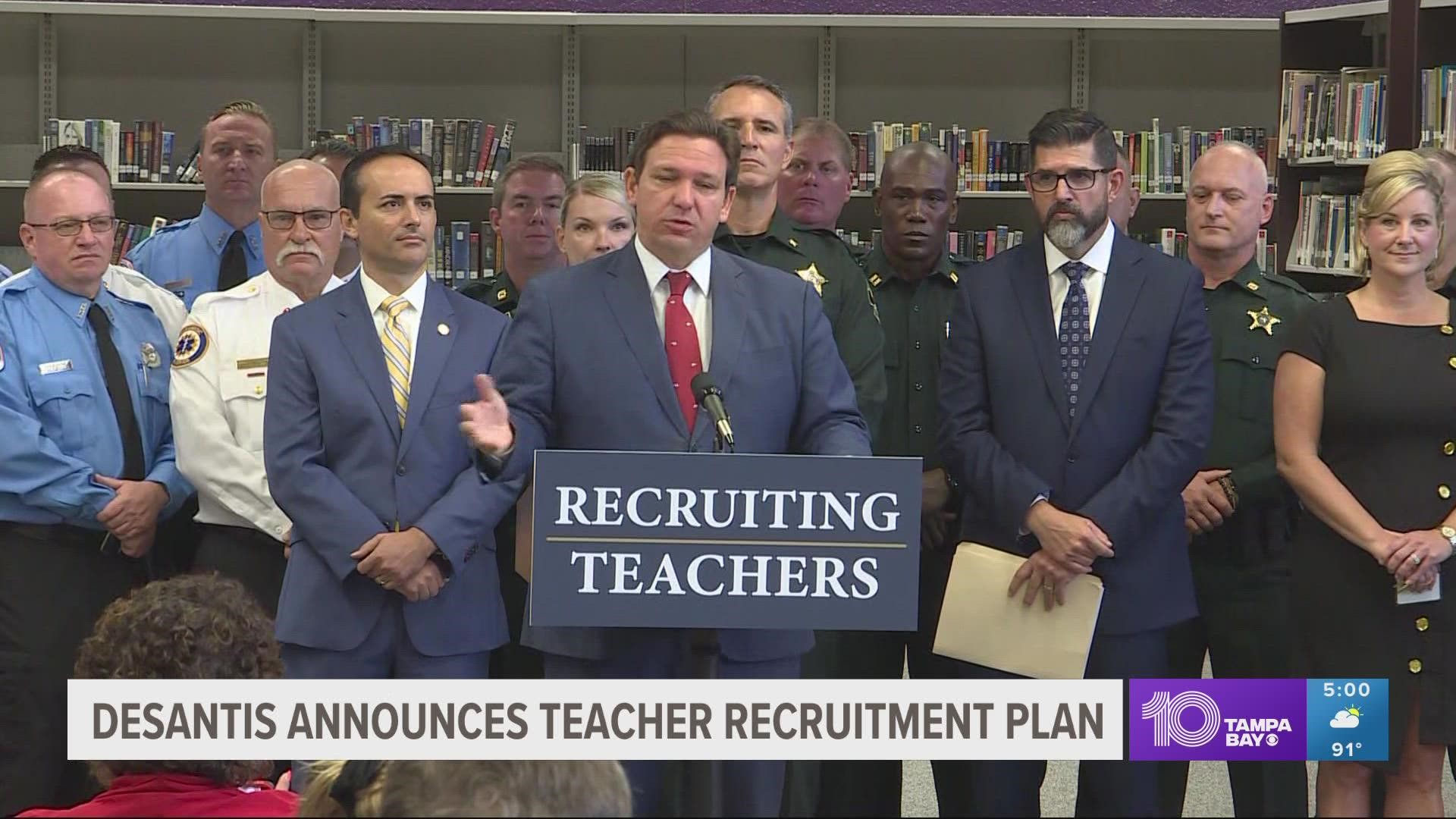NEW PORT RICHEY, Fla. — "The teacher shortage is the worst we've ever seen," Florida Education Association President Andrew Spar said ahead of this school year.
With students in combined classrooms and fewer people pursuing careers in education, the state hopes to use new strategies to bring teachers into the classroom and give them a reason to stay.
"It's not like you're gonna be a billionaire if you go into teaching, people understand that. It's a service, but if you want to recruit people that are talented, you know, it does make a difference to be able to be more competitive," Gov. Ron DeSantis said at a news conference Tuesday at River Ridge High School.
Building off of the salary increases included in Florida's recent budget, the governor announced three new initiatives for teacher recruitment he plans to pursue for the next legislative session.
1. Recruiting veterans and retired first responders
Earlier this year, DeSantis signed a bill allowing the Department of Education to issue temporary teaching certificates to specified military servicemembers who meet certain criteria.
If approved by the State Board of Education, it would allow qualified veterans to teach while they finish their bachelor's degrees.
On Tuesday, DeSantis expanded on this with a new initiative that would allow retired law enforcement officers, firefighters and other first responders with bachelor's degrees to "bring their wisdom into the classroom."
The program would waive fees for their state teacher certification exams and make them eligible for a $4,000 bonus. An additional $1,000 bonus will also be available for those who teach courses with "acute shortages," like science, ESE and reading, the governor said.
"We believe that the folks that have served our communities have an awful lot to offer and we’ve got people that’ve served 20 years in law enforcement, they retire and some of them are looking for kind of the next chapter in their life," he explained.
2. Teacher apprenticeship program
This initiative would allow Floridians with associate's degrees to get professional experience in the classroom by doing a two-year mentorship under "high-quality" teachers.
After the two years, apprentices would then go on to earn bachelor's degrees. For every apprentice they have, mentors will receive a $4,000 bonus.
“I believe that the teachers that become great teachers don’t become great teachers because they're sitting in some university lecture hall listening to some professor bloviate," DeSantis said. “I think what makes a teacher great is actually being there, doing it, watching experienced teachers..."
3. Scholarship program for teachers seeking master's degrees
This program would help current high school teachers earn master's degrees by allowing them to teach dual enrollment courses at the school where they work, rather than traveling to college campuses.
The scholarship would help cover the cost of tuition, fees and books for their master's courses, the governor said.
It would also expand opportunities for students, according to DeSantis, as they could earn college credit without having to leave their high school campuses.
“This will be a win for students because they’ll have more opportunity. It’ll also be a win for teachers and their professional development," he said.
Florida Agriculture Commissioner Nikki Fried, a Democratic candidate running for governor, accused the governor of "lowering the bar for teachers in Florida" with these new initiatives.
She issued this statement:
“Let me be clear: we should not be lowering the bar for teachers in Florida. Instead of paying teachers what they’re worth and agreeing to stop politicizing their jobs, DeSantis is trying to let Floridians with no experience and minimal training teach our kids.
“It’s not rocket science: we have a teacher shortage crisis because DeSantis has turned classrooms into battlegrounds to fight his culture wars and divide our state. Allowing anyone to teach without a certificate will push Florida even further to bottom of the rankings when it comes to the quality of our education, and our kids will ultimately pay the price. There are plenty of qualified people who would love to be certified teachers if they were paid enough to make ends meet and didn’t have to buy basic classroom supplies with their own money. This is unfortunately just another fight in DeSantis’ war on public education and kids in Florida.”

